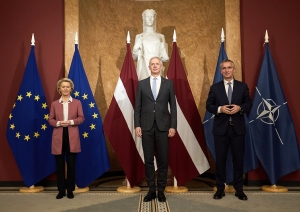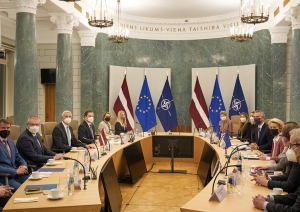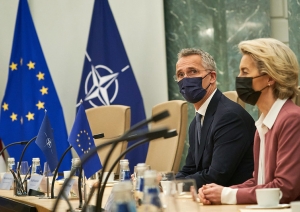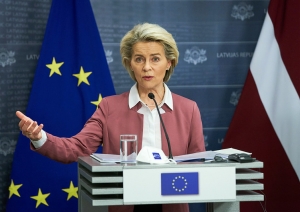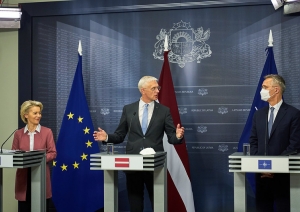Within the framework of the meeting held on Sunday, 28 November, Prime Minister Krišjānis Kariņš, President of the European Commission Ursula von der Leyen and NATO Secretary General Jens Stoltenberg discussed the situation on the border of the European Union (EU) with Belarus and the currentsecurity situation in the region.
“Today we had a very important and symbolic meeting - both the President of the European Commission and NATO Secretary-General came to Rīga for a joint visit. We are currently facing a number of simultaneous and interlinked threats in Europe. Despite these efforts to divide us, the Member States of the European Union and NATO are united. This visit proves this and clearly shows that the European Union and NATO are the guarantors and strength of Latvia’s security," said K. Kariņš, noting that Latvia is grateful for both organisations’ solidarity and support to date. The Prime Minister also admitted that Latvia calls for enhanced NATO presence in the region, in the light of the current challenges for the security in the region.
According to the Prime Minister, Europe is currently facing a hybrid attack by the Belarus regime on the border of Latvia, Lithuania and Poland, which is also the border of the Member States of the European Union and NATO. In addition, we also receive information about the concentration of Russian military forces in the border area of Ukraine. Europe is also experiencing an increase in energy prices, mainly gas, which is affected by Russia’s manipulations with gas supplies, and the disinformation campaigns coming from Russia and Belarus are also on-going.
The visit of the two high-level officials to Rīga is held on a symbolic date - on this day 15 years ago, Rīga hosted a NATO summit. Today’s visit takes place the day before the NATO Foreign Ministers’ meeting in Rīga, where many key security-related issues are on the agenda fordiscussions.
At the press conference following the meeting, Ursula von der Leyen confirmed the EU’s support to Latvia by providing financial and human resources assistance. J. Stoltenberg, in turn, stressed that today’s visit to Rīga was a confirmation of the close cooperation between NATO and the EU, which is particularly important now, in view of the events on the EU-NATO external border with Belarus, as well as on the border of Ukraine. The NATO Secretary General expressed solidarity with Latvia and other countries facing the hybrid attack by the Belarus regime.
After the trilateral meeting, the Prime Minister together with Ursula von der Leyen and Jens Stoltenberg visited the NATO Strategic Communications Centre of Excellence to learn moreabout its activities and discuss the use of disinformation as a part of hybrid attacks and the Centre’s role in combating it.




